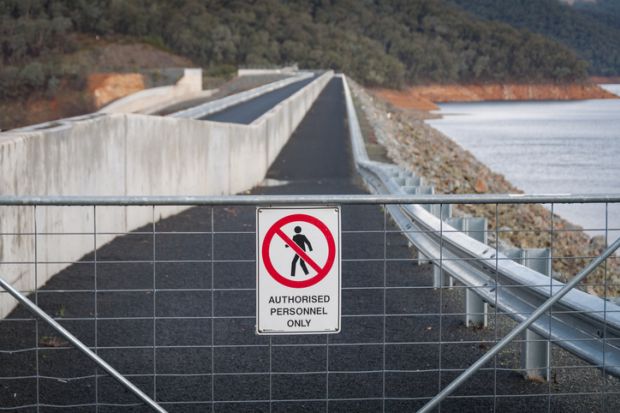Universities and research institutes are demanding changes to government bailout rules, as Australia’s dormant parliament reconvenes to legislate a A$130 billion (£64 billion) coronavirus bailout package.
The sector appears unlikely to obtain last-minute eligibility for the JobKeeper Payment, which subsidises salaries at enterprises facing steep downturns because of the pandemic.
Universities had not been expected to qualify for the subsidy, which is only available to organisations that can demonstrate losses of at least 30 per cent of their turnover. But the sector’s hopes were raised when the government reduced this threshold to 15 per cent for organisations registered with the Australian Charities and Not-For-Profit Commission – a criterion that includes universities.
However, assistant finance and charities minister Zed Seselja has since indicated that the lower benchmark will not apply to universities.
Representative body Universities Australia said that it was disappointed to be excluded. Chief executive Catriona Jackson said that the sector stood to lose between A$3 billion and A$4.6 billion from lower international enrolments in the second half of the year – an estimate that she described as “conservative” – on top of the “very significant costs” of student assistance packages and conversion to online classes.
“Access to that scheme would have been very important,” she said. “We do not expect there to be no pain for universities. We just want to minimise the level of pain so there won’t be permanent damage to a system that is absolutely fundamental to national recovery.”
Meanwhile, medical research institutes say the eligibility rules for the JobKeeper Payment will leave them “unintentionally” excluded because of the way that their funding is structured.
The Association of Australian Medical Research Institutes (AAMRI) said that while income from government research grants was relatively stable, it was tied to other “gap” sources of income – including philanthropy, commercialisation and research contracts – which faced severe losses because of the coronavirus.
This would prevent institutes from using government grants, which cannot be spent on indirect research costs such as support staff. Consequently, AAMRI says only fundraising losses should be taken into account in determining institutes’ eligibility.
“Without the gap funding, the wheels fall off and our day-to-day research can’t function,” said AAMRI president Jonathan Carapetis. “If we do not preserve our medical research capacity during this extraordinary time, the entire sector – and our capacity to discover new treatments, diagnostics and vaccines – is at peril.”
The JobKeeper legislation, which has not been released publicly, is due to be debated on 8 April. While eleventh-hour changes are possible, as occurred a fortnight ago when students were granted a social welfare top-up, the government has ruled out demands to include more casual employees in the JobKeeper scheme.
Meanwhile, universities have backed calls for governments to contribute “hardship” money for students. Ms Jackson said that universities’ assistance funds were “deluged” as soon as they were announced.
The Innovative Research Universities group said that all its members had assistance schemes such as food packages, emergency cash and fee waivers. But while domestic students qualified for government income support, their international counterparts – many rendered jobless by the pandemic – were excluded.
Executive director Conor King said that the government had a responsibility to support all students suffering coronavirus-induced financial hardship, irrespective of their nationality. “We need a fallback program that enables anyone legally in Australia to make a claim in extreme circumstances.”




